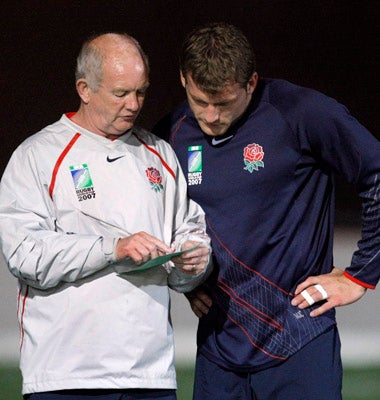Ashton reveals secret of team's success as Cueto gets final call

It took Brian Ashton 10 months and 15 matches to find his way to the place all rugby selectors love to be – the land of the unchanged team – and if he was unable to stay there as long as he might have wished, he at least put down some roots.
When England, the reigning champions, set about defending their world title against South Africa in this weekend's final at Stade de France, they will do so with 14 of the men who saw off the host nation at the same stadium five days ago. The exception? Mark Cueto of Sale, who replaces the injured Josh Lewsey on the left wing.
There had been talk of Dan Hipkiss, the Leicester centre, being retained in midfield as a reward for his impressive efforts against the French – a move that would have meant shifting Mathew Tait of Newcastle to the wide position.
Ashton confessed yesterday that it had been a "close call", but he was probably right in resisting the temptation to tinker. As someone, somewhere once said: "If it ain't broke, don't fix it." "Cueto has played a lot of international rugby in the back-three area and as we expect a fair old aerial bombardment from the Springboks, experience will count for a lot," the head coach explained. Hipkiss, who has not started a game in this tournament but has caught the eye in each and every one of his cameo appearances, remains on the bench. Given the overt physicality of the Springbok approach to games of rugby – even those that do not have the Webb Ellis Trophy on the end of them – he can expect to see action at some point.
Ashton has not always been at his most communicative during this tournament, but he was at his best yesterday. He cracked a decent joke about England's ever-expanding multitude of travelling supporters, now calculated at 50,000 – "I don't know how they'll get here, what with a transport strike going on in France, but they will: we're well known in England for swimming the Channel" – and was highly entertaining in his dismissal of one or two of the crazier notions being peddled about events behind the scenes. Pressed on the odd but widely circulated theory that the holders had moved away from their "Leicester" style and adopted a "Wasps" style instead, he said: "I don't get the relevance of the question because it's not true.
"After the defeat by the Boks in the pool stage, I held a meeting with the scrum-halves, the outside-halves and the inside centres about how we should proceed. There was no one from Leicester among them, and no one from Wasps either. Those particular players came from Harlequins, Bristol, London Irish, Newcastle, Bath and Saracens."
Another notion being pushed hard in the capital is that the English, dismissed as no-hopers after the early misfire against the United States and the comprehensive breakdown against the South Africans, are more than satisfied with their place in the final and therefore not in the optimum frame of mind to step up one last time. Ashton waded into this one too, but it was a certain Jonny Wilkinson who made the telling comment.
"If you could only spend some time inside our camp, you'd understand how much this game means to everyone involved," said the goal-kicker. "As soon as we heard the final whistle last Saturday, we turned our minds towards this match. There is nothing more important to this group of players than these final 80 minutes."
Wilkinson has had a strange tournament, to be sure. Injured for the opening two matches – good games to miss in anyone's book – his marksmanship has been off-radar.
One extraordinary statistic reveals that of the 16 goal-kickers who have taken 15 or more shots at the sticks during the competition, only one, the Georgian stand-off Pavle Jimsheladze, has a worse strike-rate. Yet he continues to work the oracle: amid the fluffed opportunities, there were game-changing goals against Samoa, Australia and France.
He is at his best when the nerves are jangling. "Going back to when I was 18, I can't remember playing in a match when there wasn't a kick that set my heart racing," he said. "It's part of a goal-kicker's life."
Both Wilkinson and the captain, Phil Vickery, consider South Africa to have been the form team in the tournament, and as a consequence, they believe the final challenge of this remarkable seven-week adventure to be the most daunting. "You could see the best of the Boks in their very first game against Samoa," the outside-half continued. "Their physicality enabled them to weather the early storm, wear down their opponents and play the rest of the game as they wanted to play it.
"But they're clever thinkers, too. They're switched-on players who make cool-headed decisions when it counts." Vickery struck a similar chord.
"To know what Test rugby is truly about, you have to play against South Africa," said the big West Countryman. "They have so much power and speed in their side. When you add in the experience they have throughout the squad, it's very difficult to identify weaknesses." Very true.
But the weaknesses are there, not least in the front row of the scrum, and as this is precisely where Vickery does his primary job of work on behalf of the team, he was being just a touch economical with the truth.
Subscribe to Independent Premium to bookmark this article
Want to bookmark your favourite articles and stories to read or reference later? Start your Independent Premium subscription today.

Join our commenting forum
Join thought-provoking conversations, follow other Independent readers and see their replies
Comments